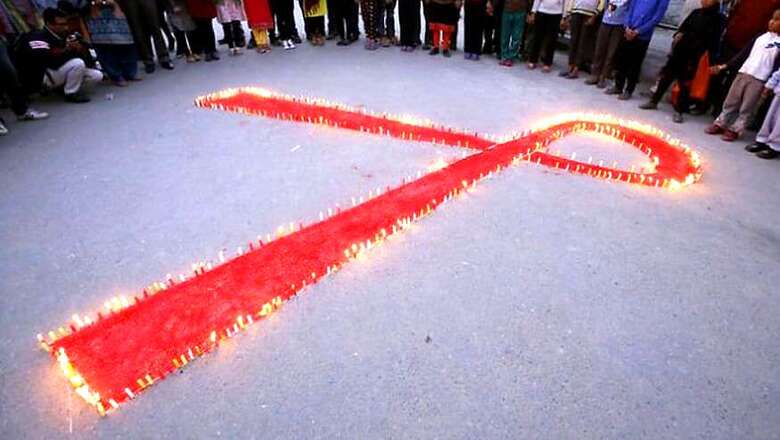
views
New Delhi: A crucial bill to ensure equal rights to people afflicted by HIV and AIDS in getting treatment, admission in educational institutions and jobs, was passed by the Rajya Sabha on Tuesday.
The Human Immunodeficiency Virus (HIV) and Acquired Immune Deficiency Syndrome (AIDS) (Prevention) and Control) Bill, 2014, moved by Health Minister JP Nadda, was passed in the Upper House by a voice vote.
During the debate on the measure, many members suggested amending the Section 14(1) of the bill, to remove the phrase "as far as possible" for providing medical treatment to the Centre and the states to those infected with HIV and AIDS.
In his reply to the debate, Nadda said, "I would like to inform the House that while making the rules, we will ensure that nobody is denied treatment and we are committed to providing medical treatment to all those living with HIV or AIDS. We are going with an aggressive policy."
Stressing the government's commitment to the issue, the minister said, "India will treat anyone with HIV and AIDS. Anyone in India having HIV or AIDS, the government of India will take care of the treatment."
He said there will be a provision in the rules to provide justification for denying treatment to the patients. A large number of members were of the view that the phrase "as far possible" would defeat the purpose of the bill, as it provides a leeway to the Centre and the states.
The section says: "The measures to be taken by the central or state governments under Sector 13 shall include measures for providing as far as possible, anti-retroviral therapy and opportunistic management to people living with HIV or AIDS."
The minister said the passage of the bill made this a "historic day" because the government can now ensure a better quality of life to people living with these diseases. On the member's concern over insufficient allocation for National AIDS Control Programme, Nadda said Rs 2,000 crore has been allocated for this year and there is no question of reducing funds for this central scheme.
Congress leader Jairam Ramesh had said during the debate that the government has provided Rs 2,000 crore for the scheme
for 2017-18, which should be raised to higher levels.
On the issue of infection from blood sourced from various blood banks, Nadda said the government is giving special attention to this issue and the number of such cases has come down drastically.
The bill was introduced in the upper house of Parliament in 2014 and then referred to the Parliamentary Standing Committee which gave its report in 2015.
According to the measure, India at present is estimated to have 2.39 million people living with HIV/AIDS, the third highest number after South Africa and Nigeria. Currently, HIV is more prevalent in high-risk groups like female sex workers, homosexuals and injecting drug users.
Nadda said the bill provides for the appointment of one or more ombudsman in every state, for which the central government will circulate uniform guidelines. He said the number of employees in health institutions for the appointment of ombudsman has been reduced to 20 or more employees from the earlier provision of 100 or more in cases where the incidence of infection is high. He explained that this number has been arrived at rationally after taking into consideration the suggestions of the Parliamentary Standing Committee which examined the bill.
While moving the bill for consideration of the House, the minister said it also provided for informed consent and confidentiality with regards to their treatment, places obligations on establishments to safeguard their rights and creates mechanisms for redressing their complaints.
There is a penalty to the tune of Rs 1 lakh for breach of confidentiality of the patient's detail. The bill says it's important for high-risk groups to access services such as treatment of sexually transmitted infections, HIV testing, condoms, clean needles and syringes to prevent HVI transmission to the general public.
It is also necessary to address the issue of stigma faced by those infected by HIV and AIDS, to ensure confidentiality and privacy while providing HIV and AIDS related services and recognise the need to safeguard the rights of these patients in both private and public firms, it added.
Oscar Fernandes of Congress congratulated the government for the bill and suggested allocation of more funds for research
on vaccines for complete cure. Fernandes said the country is supplying HIV/AIDS medicines to 180 countries and has research capabilities to come out with vaccines to cure the disease. He also urged the government to achieve "zero infection" during delivery and sensitise people at the gram panchayat level on this matter.
R Laxmanan of AIADMK emphasised the need to provide an equal right for medical treatment as only 25 percent of those affected got treatment out of 21 lakh infected people in India, which was much less than the global average of 41 percent.
V Vijayasai Reddy (YSRCP) said there is a difference of opinion between the Home Ministry and Health Ministry on the issue of treating AIDS patients on par with others in security forces.
K Somaprasad (CPM), Ashok Siddharth (BSP), Prabhakar Kore (BJP), D Bandyopadhyay (TMC), Naresh Aggarwal (SP), Tiruchi Siva (DMK) and MV Rajeev Gowda (Congress) participated in the debate.



















Comments
0 comment